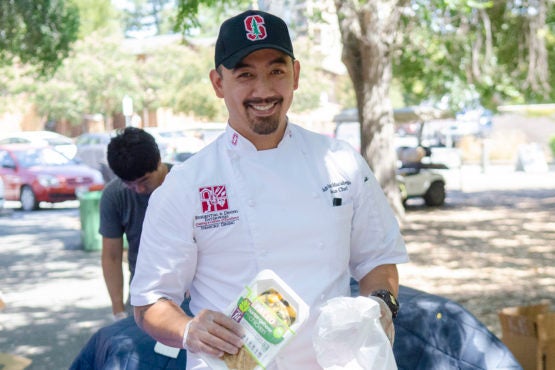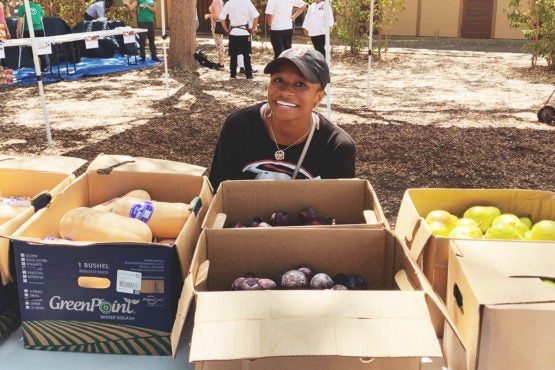Stanford hosts pilot pop-up food pantry
The recent event was a collaborative effort among students, Stanford Residential & Dining Enterprises and Second Harvest Food Bank of Silicon Valley.
Stanford Residential & Dining Enterprises (R&DE) staff and graduate and undergraduate students helped distribute food at a pilot food pantry event Monday afternoon in Escondido Village. This was the first of three planned pop-up food pantry events supporting students and their families who self-identify as food insecure. The three-month pilot will continue in September and October.
The pilot program grew out of conversations between R&DE Stanford Dining and students. Collaboration with the Graduate Student Council, ASSU and the Stanford Solidarity Network was critical in assuring the program’s success.

Stanford sous chef Adrian Macabenta was among the volunteers at Stanford’s pilot food pantry. (Image credit: Alex Kekauoha)
“It’s always very gratifying to work closely with students on programs that are important to them and support their needs,” said Eric Montell, executive director of R&DE Stanford Dining. “I am thankful for their partnership and look forward to working together on future programs.”
Stanford also worked with Second Harvest Food Bank of Silicon Valley, a San Jose-based nonprofit organization that supplies groceries to food-insecure residents in Santa Clara and San Mateo counties.
Around noon, the Second Harvest truck delivered enough food for students who had signed up to participate in the program. More than four dozen Stanford community members showed up to volunteer. Among them were undergraduates, graduate students and R&DE staff who helped unload and unpack crates and boxes of food, including kitchen staples such as eggs and milk, and plenty of locally sourced fresh fruits and vegetables.
Luz Ayala, partnership manager for Second Harvest, said her organization uses the donations it receives to prioritize nutritious items for the roughly 290,000 people it serves throughout the region.
“We are providing them with healthier options, as we know they are more expensive than the high-in-fat and high-in-cholesterol items,” she said.

Undergraduate Kyla Bryant was among the many volunteers at the pilot food pantry. (Image credit: Courtesy Kyla Bryant)
Each eligible household that attended received about 150 pounds of food at no cost on a first-come, first-served basis. More than 150 students and family members of graduate students were served. The event started at 1 p.m. and attendees were invited to come back after 2:30 p.m. to collect additional food items if they were still available. Any remaining items were distributed to R&DE hourly staff and A La Carte, an R&DE food donation partner.
Ayala was happy to see the good turnout and said she hopes to continue collaborating with Stanford in the future. “If this works out, and we can get the clients and the volunteers to show up, we want to do this twice a month,” she said.
There are currently two more pop-up food pantries scheduled for Sept. 23 and Oct. 28.
Food insecurity is a growing concern among college and university students nationwide. For students in the Bay Area, the problem is compounded by the high cost of living. In order to address the issue, Stanford students expressed the need for this event and worked with R&DE to ensure it was brought to fruition.
“Our goal is to always work with members within the campus community to create programs and services that meet the needs of our students,” said Shirley Everett, senior associate vice provost for R&DE. “R&DE is grateful for the collaboration with the Graduate Student Council, the ASSU and the Stanford Solidarity Network and the dozens of student and staff volunteers who helped to make this important program possible.”
